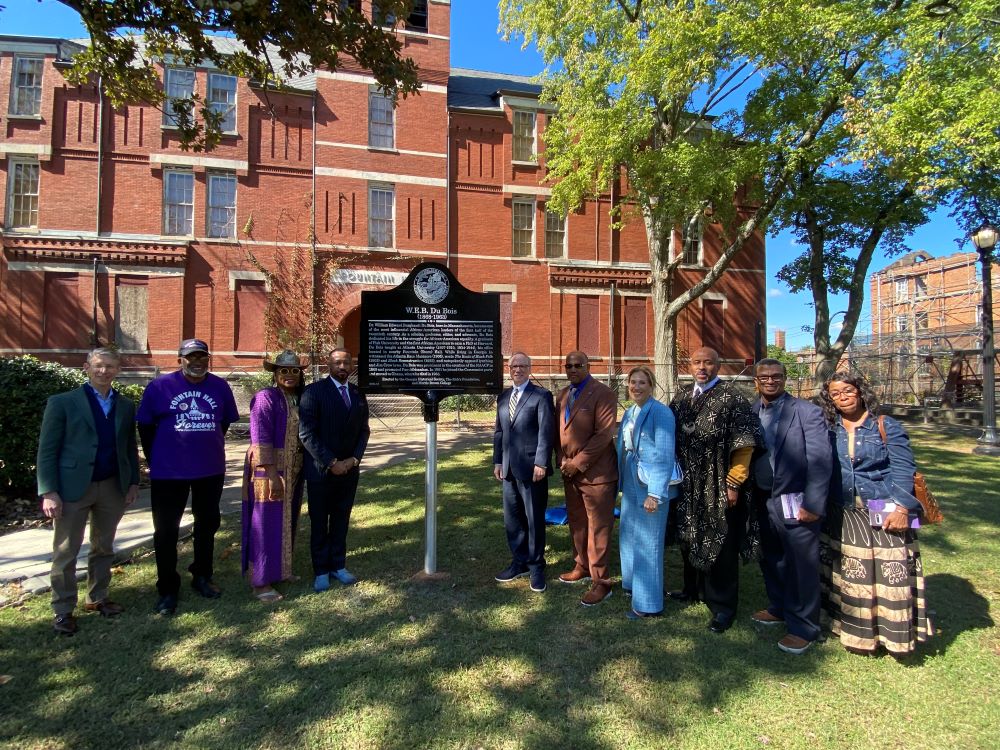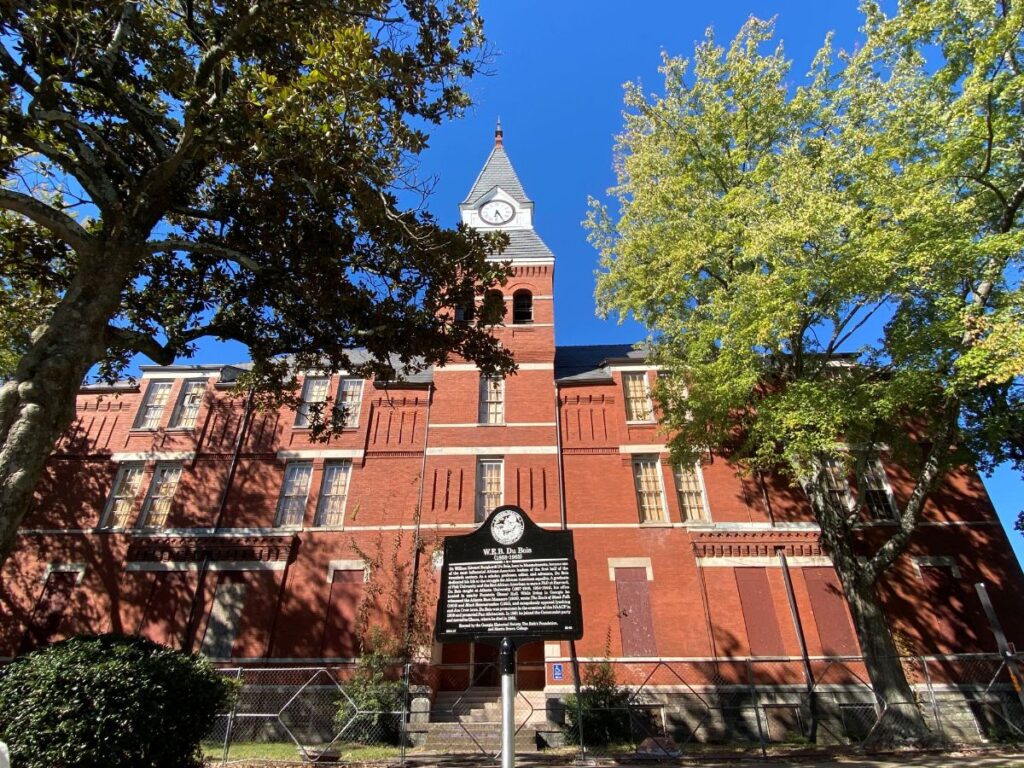
Atlanta, GA, October 17, 2024—On Wednesday, October 16, 2024, the Georgia Historical Society (GHS) unveiled a new historical marker in Atlanta about scholar, professor, editor, and advocate William Edward Burghardt Du Bois (1868-1963). The newest addition to GHS’s Georgia Civil Rights Trail, the marker was dedicated in partnership with The Rich’s Foundation and Morris Brown College.
“The influence of W.E.B. Du Bois on the struggle waged by Black people for equality in America is incalculable,” said GHS President and CEO Dr. W. Todd Groce. “Just as incalculable is the influence of Georgia on Dr. Du Bois. The events he experienced and the people he met while living in our state shaped him and his scholarship, helping America to live up to the promises of liberty contained in our founding documents. This is the first biographical marker in the South about Du Bois, and it is long overdue.”
The W.E.B. Du Bois historical marker joins the GHS Georgia Civil Rights Trail, an initiative that uses Georgia Historical Markers to highlight significant stories about the struggle for civil and human rights from Reconstruction through the late twentieth century. Born shortly after the Civil War, Du Bois became one of the most influential African-American leaders of the first half of the twentieth century, often as a result of his scholarly work and publications.
"We are honored to commemorate the life and legacy of W.E.B. Du Bois with this marker, recognizing his profound contributions to civil rights, education, and social justice,” said The Rich’s Foundation Chair John Montag. “Du Bois’s tireless efforts to advocate for equality and his pursuit of knowledge continue to inspire generations."
The marker was erected on Morris Brown College campus in Atlanta, at Fountain (Stone) Hall, the site of Du Bois’s former office. Though from Massachusetts, Du Bois lived in Georgia for two extended periods from 1897-1910 and 1934-1944. He came to Georgia having accepted a faculty position at Atlanta University (later Clark Atlanta University), eventually chairing its sociology department. As a result of his experiences and studies, Du Bois wrote some of his most influential work while in Georgia, including The Souls of Black Folk (1903), and Black Reconstruction (1935).
"It is a distinct honor to dedicate a historical marker at Morris Brown College in recognition of W.E.B. Du Bois, one of the most influential thought leaders who advanced the cause of our community,” said Morris Brown College President Dr. Kevin James. “His profound contributions continue to inspire generations, and we are proud to commemorate his legacy at this institution."
Speakers at the dedication included: Rev. Dr. Herman “Skip” Mason, Jr., Interim President, Interdenominational Theological Center and Senior Pastor, Historic West Mitchell Christian Methodist Episcopal Church; Dr. W. Todd Groce, President and CEO, Georgia Historical Society; Dr. Kevin James, President, Morris Brown College; Dr. Juliet Asher, The Rich’s Foundation; Dr. Rachanice Candy Tate, Art Historian, Curator, and Co-Director, The Legacy Museum at Tuskegee University and Member, Fountain Hall Development Group, LLC; Jeffrey Alan Peck, Sr., CEO, W.E.B. Du Bois Educational Foundation; and Rev. Charles (Chuck) Barlow, Sr., President, The Friends of Fountain Hall and Morris Brown College alumni.

The marker text reads:
W.E.B. Du Bois
(1868-1963)
Dr. William Edward Burghardt Du Bois, born in Massachusetts, became one of the most influential African-American leaders of the first half of the twentieth century. As a scholar, professor, editor, and advocate, Du Bois dedicated his life to the struggle for African-American equality. A graduate of Fisk University and the first African American to earn a PhD at Harvard, Du Bois taught at Atlanta University (1897-1910, 1934-1944), his office located in nearby Fountain (Stone) Hall. While living in Georgia he witnessed the Atlanta Race Massacre (1906), wrote The Souls of Black Folk (1903) and Black Reconstruction (1935), and outspokenly opposed lynching and Jim Crow laws. Du Bois was prominent in the creation of the NAACP in 1909 and promoted Pan-Africanism. In 1961 he joined the Communist party and moved to Ghana, where he died in 1963.
Erected by the Georgia Historical Society, The Rich’s Foundation, and Morris Brown College
For more information about the W.E.B. Du Bois historical marker dedication, the Georgia Civil Rights Trail, or the Georgia Historical Society marker program, please contact Elyse Butler, Manager of Programs and Special Projects, at 912.651.2125, ext. 119, or by email at ebutler@georgiahistory.com.
###
ABOUT THE GEORGIA HISTORICAL SOCIETY
The Georgia Historical Society (GHS) is the premier independent statewide institution responsible for collecting, examining, and teaching Georgia history. GHS houses the oldest and most distinguished collection of materials related exclusively to Georgia history in the nation.
To learn more visit georgiahistory.com.
ABOUT THE GEORGIA HISTORICAL MARKER PROGRAM
The Georgia Historical Marker Program is an important part of the Georgia Historical Society’s (GHS) statewide educational mission. Through a public-private partnership with the State of Georgia, GHS is responsible for erecting new historical markers and maintaining more than 2,000 markers installed by the State prior to the program’s privatization in 1998. Online mapping tools allow users to explore themed marker trails and design custom driving routes. Visit georgiahistory.com for more ways to use Georgia’s historical markers and experience history where it happened.
ABOUT THE RICH’S FOUNDATION
The Rich’s Foundation is a private Atlanta, Georgia, foundation whose purpose is to benefit non-profit organizations in the field of arts, civics, education, health, environment, and social welfare in the metropolitan Atlanta area. While the Foundation supports all of these areas, its primary focus has been education and social justice. Established in 1943, the Foundation was created to distribute a share of the profits of Rich’s, Inc., the Atlanta department store. Through the years, the Foundation has been a major supporter of Atlanta’s charitable and educational life.
ABOUT MORRIS BROWN COLLEGE
Morris Brown College, founded in 1881 by the African Methodist Episcopal Church, is a private, coeducational, liberal arts college engaged in teaching and public service with special focus in leadership, management, entrepreneurship and technology. The College is proud of its tradition of serving the educational needs of the best and brightest young minds, while simultaneously providing educational support to students who might not otherwise receive the opportunity to compete on the college level. Students fitting the latter are given the tools they need to increase their potential for earning a college degree.
